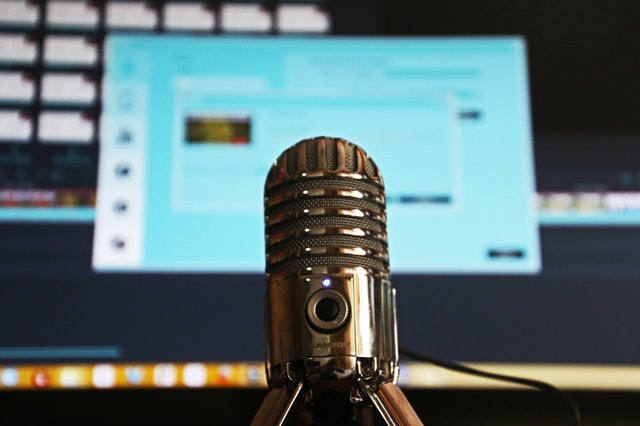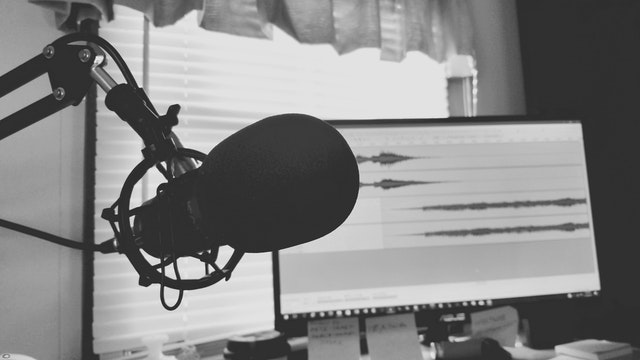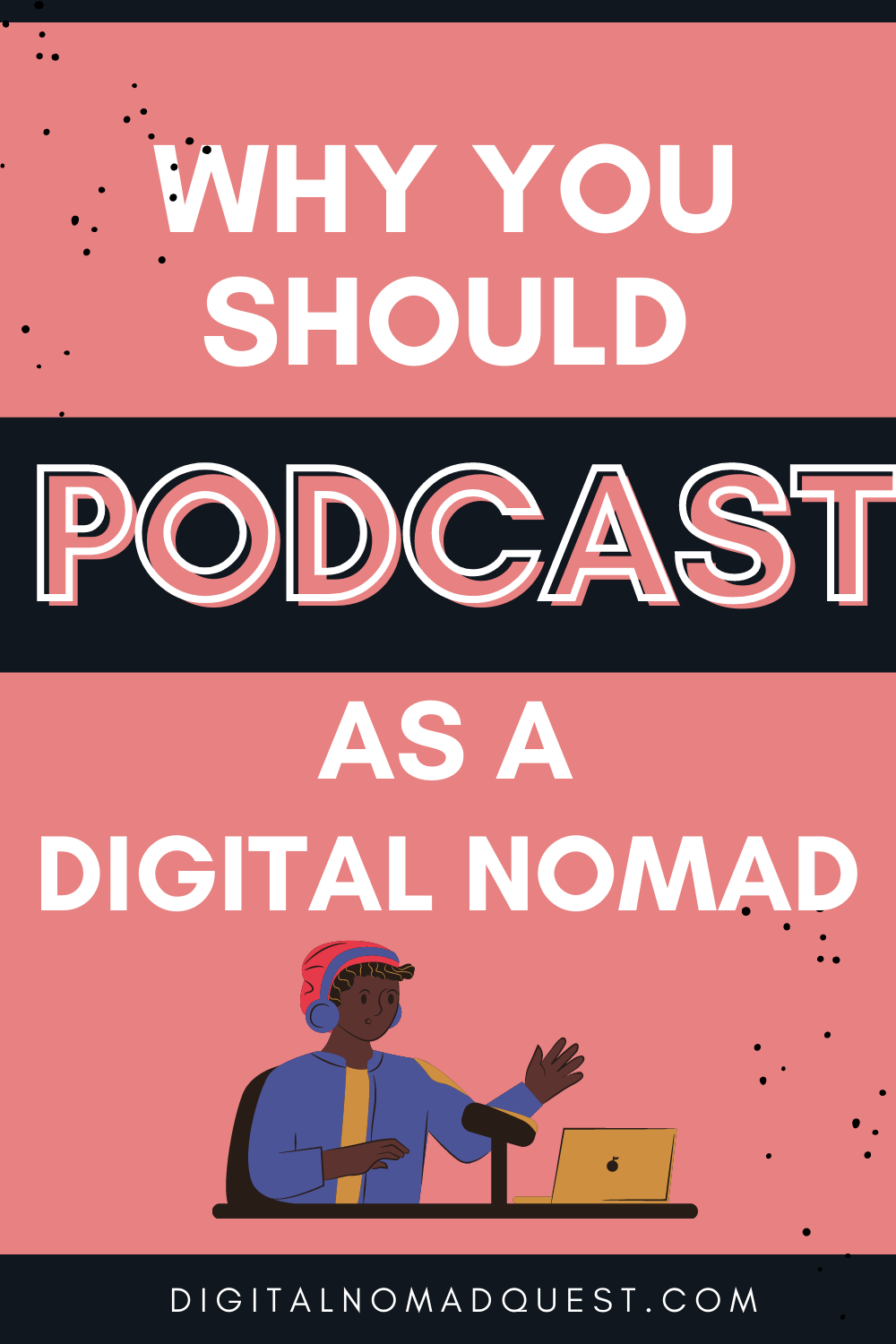Even as a writer there is still times I want to switch things up, both for my own mental sanity and to provide a different ‘voice’ to my audience. This article won’t focus on ‘how-to’ start a podcast as there is already plenty of resources out there for that. Instead here are my top 6 reasons for those who have ever thought about or considered trying podcasting and why I would highly recommend it.

Why You Should Podcast as a Digital Nomad
1. Cost investment
The greatest benefit to you digital nomads out there is the relative ease that you can begin recording, often the only equipment you need to invest in is a microphone. Contrary to many podcast guides, I DO NOT recommend getting specialized mic and mixer sets.
When I first began I researched various guides and ended up dropping a couple of hundred on two mics. They were awesome! They looked great and made me feel like a real ‘podcaster’, but feeling and looking like a podcaster is quite different than being one.
Currently while I travel I’m using a cheap no-brand $10 USB mic. It has no features whatsoever and it feels like I’ve regressed back to the 90s, but you know what? It works, and nobody sees me anyway. The important thing that matters is that the audio can be picked up clearly. There’s a really good chance that because you’ll be recording via long-distance the other party will be using their laptop mics anyway.
Software-wise I just use Skype, which is free and accessible in more countries than the majority of conference calling software.
2. It can be less time consuming
When I first started recording podcasts I approached it like I did writing, spending a bunch of time editing and tidying up small errors or moving sections around. It was such time sink and I hated doing it until one day I just relaxed around it. Once I did that I noticed that I could have a recording ready to post in far less time than my written pieces.
You will need to edit, but the approach is bigger picture. Think editing whole paragraphs instead of sentences. Just as in normal conversation, listeners aren’t going to notice the small speaking hiccups or each cleverly word. So don’t worry about your prose, concern yourself with speaking clearly and letting your personality shine.
On average each recording takes me around 2 – 3 hours of editing for an hour long podcast. I’m almost certain I’m being slow about it too. So all up it can take around a day’s work to line up schedules, plan out the podcast, record, edit, and finally publish.

3. Increasing audience connection
The beauty of podcasts is that it allows your fanbase a chance to get to experience you in a new light. Writing is often so heavily edited and formatted that it becomes a distilled version of ourselves without the rough edges.
This is great for storytelling or making your point clear, but not so great when you want your audience to connect with you. People connect to our rough edges and when we’re too ‘smooth’, we can come across too perfect giving people nothing to grasp onto. For those readers who really want to get a better understanding of the person behind the writing, this can become your way of allowing them to do so.
In my experience, the people who consume your writing content are not the same ones who consume your podcast content. Meaning that this could be a relatively low cost (and fun) format to increase your fanbase. I once recorded a podcast with another podcaster which introduced me to her audience and her to mine. The best part was that we didn’t need to do anything different from our usual routine.
4. Meeting awesome people
Being a writer can be a pretty lonely endeavor and even the staunchest introverts among us need to connect with others every now and then. When I recorded my podcasts one of the coolest things was getting a chance to speak with people that I otherwise may not have had a chance to while at the same time getting to learn about new topics.

I’m always amazed how people light up or get curious about being on a podcast yet hesitate towards being on other forms of media, and I totally understand. If you’ve ever been on camera you’ll know how hard it can be to feel ‘natural’ when you know there’s a camera staring at you. Written interviews can feel too serious like an investigation and is typically so one sided it can feel tiring for the interviewee.
Podcasting allows us to communicate with other humans while relieving some of the stress of what to say or ask because there’s someone else to help contribute ideas and insights to the conversation. But mainly it’s just the synergistic energy of two or people getting together and having a conversation about something they’re both interested in. It will give you a different perspective to look at things.
5. Portfolio diversity
We’ve all heard the adage, ‘diversify your portfolio’ to reduce risk and maximize potential gains. As a writer I don’t believe this means to write about new genres as the content you produce will still be some manner of written text.
If people see you writing about a host of various topics they may see you as a jack of all trades, but a master of none. And I will always stand firm by the belief that it is better to be known as an expert in a few areas, than average across many.
To me it’s much easier and fun to stick to topics I am interested and proficient in and present them in new ways or formats (ie. podcasts). Not only will this allow you to remain focused on the areas you are passionate about, but you will begin to look like an expert when your focus is that clear.
6. Speaking improvement
As people perpetually with our faces buried behind computer screens it’s probably fair to assume that like me, many of you have some strong introverted tendencies, just a guess. Due to that sometimes our speaking skills take a bit of a hit.
I hated my voice for a long time. I used to get teased about it when I was younger which always made me self-conscious and taught me to have negative associations with it and would speak fast or mumble a lot. So you can imagine how horrid the experience of editing my voice must have felt like in the beginning.
While it still weirds me out whenever I hear my own voice, I no longer think carry those same negative beliefs anymore and I’ve gotten a lot better with my speaking speed and annunciations, which in turn gave me a lot more self-confidence as I learnt to accept my voice.
Conclusion
Hopefully this list has helped open your thoughts about potentially adding podcasts to your toolkit. It’s a great tool and I find it helps break up the monotony of writing. Obviously there will be other things to consider, such as hosting and planning out the structure of sessions. However I would argue those are normal considerations for any path you go down.
Even if you don’t end up becoming a famous podcaster, building new connections and gaining more confidence in yourself will always be of great benefit, and you never know where some of those roads could eventually lead toward.

